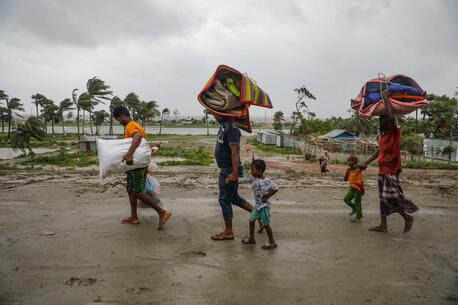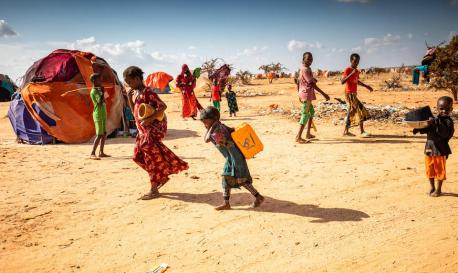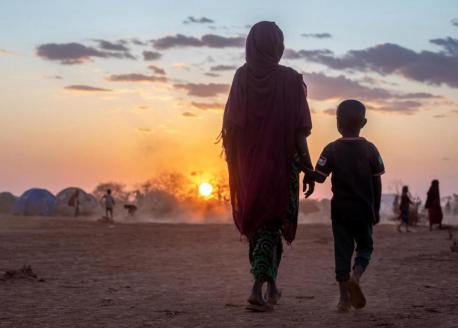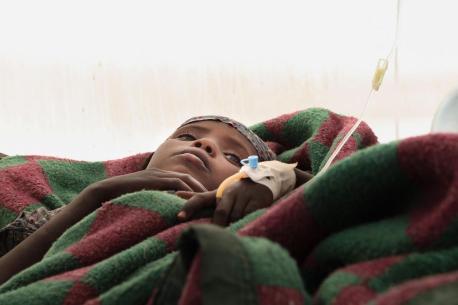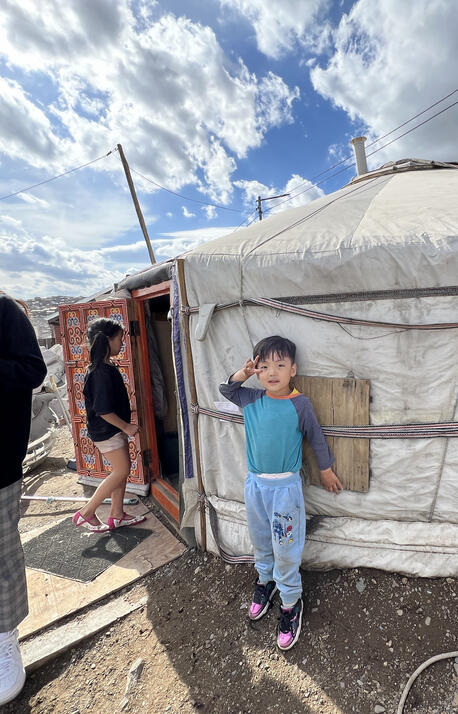
UNICEF in Mongolia
UNICEF works closely with the government to meet the needs of children and families in Mongolia, where more than a million people still live as nomadic herders. Learn more, including how to help.
Challenges for children in the Land of the Blue Sky
By many measures, Mongolia, a landlocked, lower-middle-income country situated between Russia and China, is doing quite well. The nation has enjoyed substantial economic growth and social progress since the early 1990s, when it reverted to a market economy after 70 years as a Soviet satellite, and reorganized the government as a parliamentary republic with a democratically elected president.
Yet, more than one in four people live below the poverty line — nearly one in three in rural areas. And while government spending on social services is considerable, social protection programs do not always reach those most in need due to system constraints.
The logistics of reaching every child with health and other services is challenging. While 69 percent of Mongolia's population of 3.4 million, which includes 1.3 million children, live in urban centers, the remaining 31 percent live as nomads, scattered across the country's vast territory of over 600,000 square miles.
UNICEF is there, advocating for child rights and helping to improve their lives.
The dreaded dzud and other climate emergencies in Mongolia fuel humanitarian needs
Progress toward the Sustainable Development Goals in Mongolia has been mixed — solid or moderate in some areas, such as poverty reduction, education, gender equality and clean energy, while lagging behind in others, such as climate action and ending child hunger.
And Mongolia is highly vulnerable to climate change. Dzuds — prolonged periods of severe winter weather — have become both more severe and more frequent, requiring emergency support for affected families.
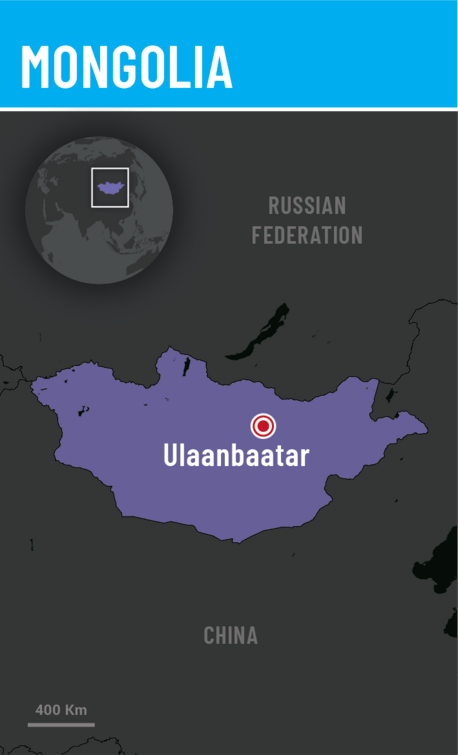
When dzuds happen, large numbers of livestock die, primarily from starvation as they are unable to graze, or in some cases freezing to death — destroying livelihoods and food security. The 2023-2024 dzud was particularly bad: 7.4 million animals died, impacting 150,000 people.
In summer, heavy rainfall can cause flooding, another natural hazard, and an increasingly unpredictable and destructive one. Air pollution, also exacerbated by climate change, is a major threat to child survival and development.
In maternal and child health, the country has achieved significant progress. Under-5 child mortality and infant mortality rates have declined by over 60 percent, and maternal deaths by over 70 percent, since 2000.
National child immunization rates are close to universal — around 95 percent — though there are disparities across geographies in terms of access to equipment and qualified doctors.
And chronic malnutrition among children is down. However, more than a quarter of all children ages 6 to 11 are overweight or obese, and vitamin A and vitamin D deficiencies are rampant among children under age 5.
So are respiratory illnesses, driven by the country's poor air quality. The issue is especially acute in the capital city, Ulaanbaatar, where most households in densely-populated, low-income ger districts still use coal-burning stoves for heating and cooking, with diverse effects on maternal and child health during winter.
A ger is a traditional-style mobile home, a circular wood-framed tent wrapped in yak felt. Ger districts are permanent settlements that blanket the city's outskirts, the result of an uptick in migration from the outer provinces during the 2000s and 2010s.
A lack of safe water and sanitation infrastructure in these communities — as well as in the nation's many small towns and rural areas — is another issue. Dwindling freshwater sources and other climate change impacts have affected water accessibility and safety all across the country. In many provinces, drinking water contains unsafe levels of radon, lead and other heavy metals.
There are challenges in children's education as well. The vast majority of children in Mongolia complete primary school; the rates are 93 percent overall, and 91 percent among girls. In rural areas, children typically live in school dormitories to make attendance feasible beginning at age 6 or 7. Yet many children living in nomadic and pastoral communities, as well as children with disabilities, are often deprived of educational opportunities.
Early childhood education, considered crucial for healthy development, is becoming more accessible as Mongolia moves toward a national integrated early childhood development (ECD) strategy with UNICEF's support. Yet attending kindergarten is still a challenge for children living in remote places.
UNICEF is working with the government and other partners in Mongolia to address these and other issues, while making sure that efforts to meet immediate humanitarian needs are also serving the country's longer-term development goals.
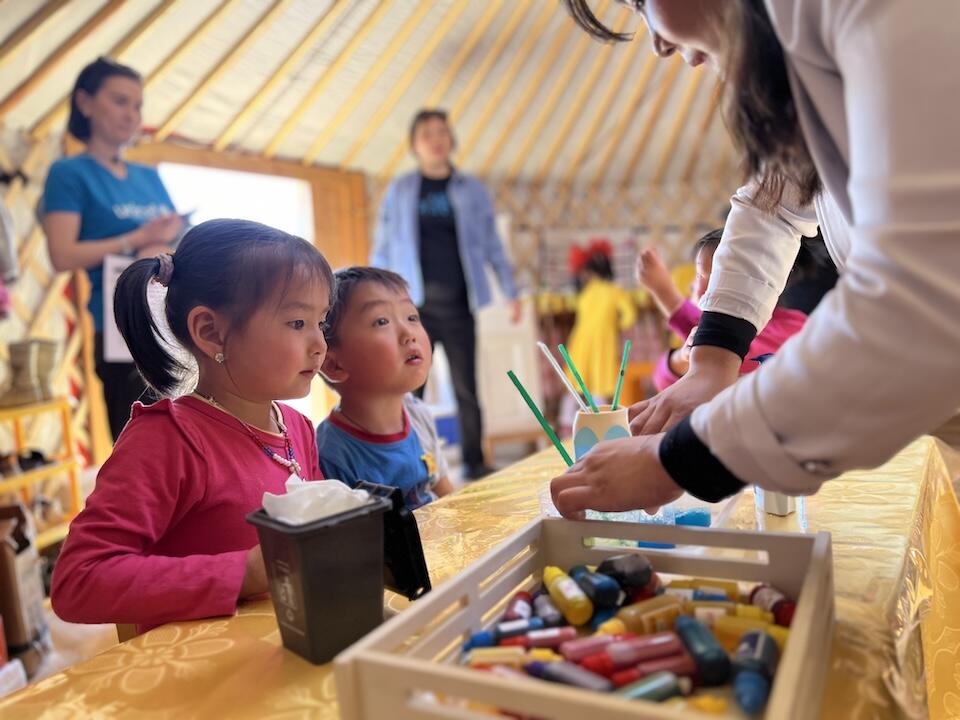
What UNICEF is doing to support children in Mongolia and promote their rights
UNICEF has maintained a presence in Mongolia since the 1960s, overseeing vaccinations and other activities from a regional office. The UNICEF Mongolia country office opened in 1992 to ramp up direct support to children and families in three high-needs provinces. In 2022, with Country Representative Evariste Kouassi-Komlan at the helm, the team adopted an ambitious plan to expand UNICEF programming and partnering efforts nationwide.
Continued close collaboration with the government is considered essential as UNICEF expands into all 21 provinces, Kouassi-Komlan says. "We work to build relationships across sectors," he told UNICEF USA. "We work with partners to help develop innovative solutions and test models for action the government can then scale. We demonstrate where it makes sense to invest. And every $1 UNICEF invests yields $1,000 worth of impact when leveraged locally."
Priority program areas include health, nutrition, education, water and sanitation and climate change and social protection.
In 2023, Mongolia approved an integrated ECD action plan to accelerate child-centered and holistic childbearing — a striking departure from the free-range, hands-off parenting approach of previous generations, and reinforced through UNICEF-supported "parenting clubs" and other community-based programs providing a range of ECD guidance and training to caregivers.
The plan emphasizes nutrition, protection, responsive care and early learning as foundational for a child's developing brain and body. Already there are some well-established ECD centers in UB and in some provincial capitals thanks to UNICEF's support, including from UNICEF USA donors.
When there is extreme winter weather or another natural disaster strikes, UNICEF is there to support the emergency response. During the 2023-2024 dzud disaster, UNICEF supported government-led emergency relief efforts by providing health and hygiene kits and other lifesaving supplies and mental health and psychosocial support to affected children and families, and helping to clear roads to restore access to essential services.
Engaging young people — empowering them with knowledge and skills, and preparing them to become leaders and change agents — is a top priority. UNICEF helped form a Teen Parliament in 2021.
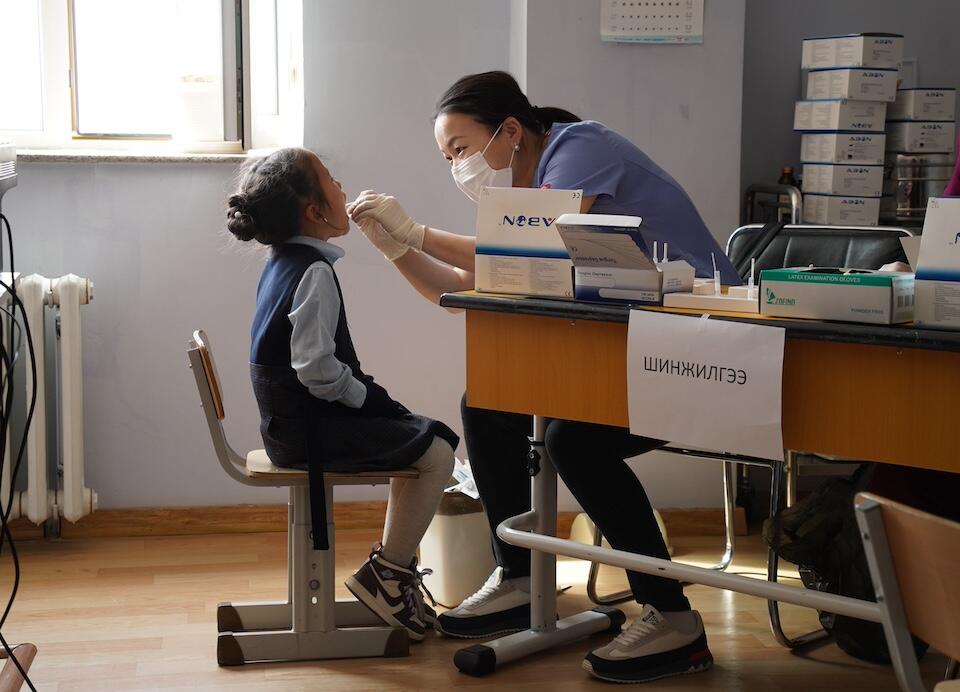
Improving children's health in Mongolia
Most UNICEF funding in Mongolia goes toward health programs. UNICEF Mongolia works closely with local and provincial governments to ensure continued access to essential services — providing direct support to primary health centers, helping to train community health workers and otherwise strengthen health care service delivery, paying particular attention to vaccination. There is universal health coverage, provided by the government.
During the COVID-19 pandemic, UNICEF provided technical assistance and equipment to help build out the nation's cold chain, which helped avoid a backslide in immunization coverage across the board.
In 2023, UNICEF helped launch a program to screen all school children for the bacterial infection that causes strep throat — a common illness in kids that often goes undetected and untreated, heightening risks of cardiovascular disease later in life. UNICEF supplies antibiotics and is helping to standardize the testing and treatment referral process.
Taking aim at Mongolia's air pollution problem: converting from coal to clean energy at home
Helping Mongolia tackle its air pollution problem is another top priority. Improving indoor air quality in particular is considered critical for reducing rates of respiratory illness among children and improving their general well-being.
A UNICEF-supported initiative called CHIP (short for a line of cooking, heating and insulation products) introduced a replacement for the coal-burning stove. By the end of 2023, some 2,000 of these alternative units had been purchased and installed in individual households, schools and community centers around Ulaanbaatar and three other urban centers.
The success of the CHIP pilot helps lay the groundwork for a wider roll out as part of a broader Clean Air Action Plan. Government financing along with low-interest bank loans help keep the units affordable for families.
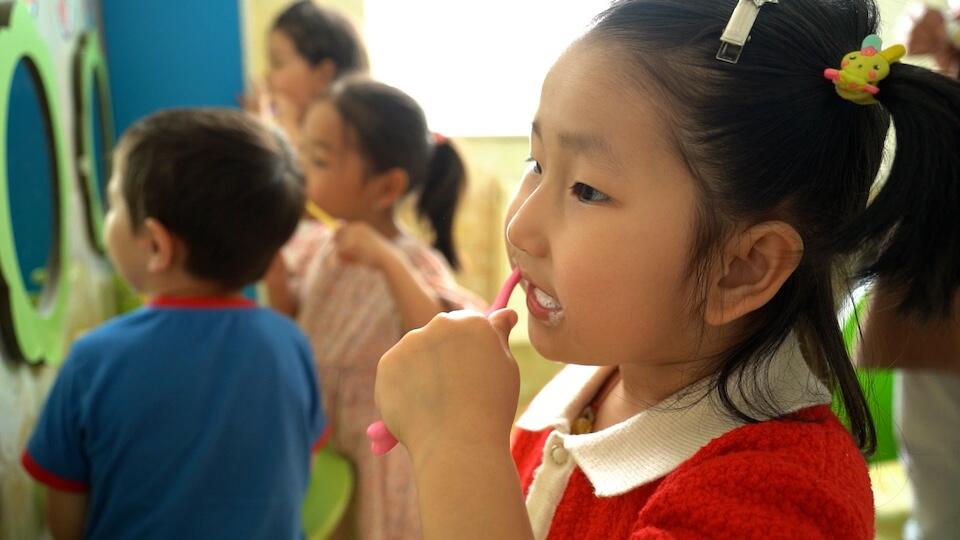
Improving water quality helping to build sustainable, climate-resilient water and sanitation systems
Mongolia is also working to strengthen the resilience of water, sanitation and hygiene (WASH) systems, an integral part of the country's climate change response. UNICEF is supporting this work through actions like using renewable energy, improving water and energy efficiency, reducing emissions and generating energy from waste.
UNICEF is also involved in helping to:
- install indoor WASH facilities in schools and health facilities — not only out of respect for human dignity and human rights, but also to promote hygiene practices and menstrual hygiene management
- create climate-resilient, energy-efficient water and sanitation facilities in schools, kindergartens and student dormitories
- transform water wells into smart water kiosks that provide round-the-clock water access and setting up teams to maintain hygiene around these kiosks
- build WASH facilities (showers, toilets, sinks) in schools and community centers
- establish Water Safety Councils and water safety plans
Ensuring equal access to quality education — from early childhood to adolescence
One of the main challenges in education in Mongolia is a lack of opportunities for early learning, a key aspect of healthy development during a child's first years.
UNICEF Mongolia supports and helps implement a variety early childhood education programs, including mobile kindergartens, tented learning spaces for that can be relocated to meet nomadic families where they are; "Tablet Teachers" to support instruction in informal settings; and audio lessons loaded onto a handheld digital device UNICEF distributes directly to families.
UNICEF also provides technical and other assistance to the Ministry of Education to help strengthen the country's education system in ways that benefit students of all ages.
These efforts include:
- revising class curricula to improve foundational learning outcomes
- advancing inclusive education for the most disadvantaged children, including children with disabilities and girls and boys from remote and minority populations
- supporting the GIGA initiative goal of ensuring stable internet connections at all 859 public and private schools
Protecting children's right to grow up in a safe and protective environment
Mongolia lacks a comprehensive child protection system to effectively prevent and respond to violence, exploitation and abuse of children. Harmful social norms and practices remain prevalent; nearly half of all children aged 1-14 experience violent discipline, for example.
Access to the internet, meanwhile, has heightened a range of protection risks for children, from cyber-bullying to emotional and sexual abuse and exploitation.
UNICEF is helping to strengthen child protection in Mongolia through a range of interventions, including the roll out and expansion of child protection case management and referral services; strengthening capacities of child protection and social service workforces; promoting positive discipline practices among teachers and parents and assisting with justice system reforms.
Supporting the "Digital Nation" vision for Mongolia
UNICEF supports the government's vision for Mongolia to become a Digital Nation, by undergoing a digital transformation across various fields while also fostering digital literacy.
In health, this means digitizing medical records and other health information, making them part of the government's E-Mongolia service platform, which is helping to streamline processes, improve patient services and reduce costs.
In education, UNICEF is focused on implementing the Digital Community Information Workers initiative to build the digital skills of teachers, so that they in turn can support other school staff and community members in accessing technologies and digital learning platforms.
UNICEF works in over 190 countries and territories to create a more equitable world, where every child can be healthy, educated, protected and respected. Learn more.
Help increase UNICEF's impact for children in Mongolia and around the world. Donate today.
